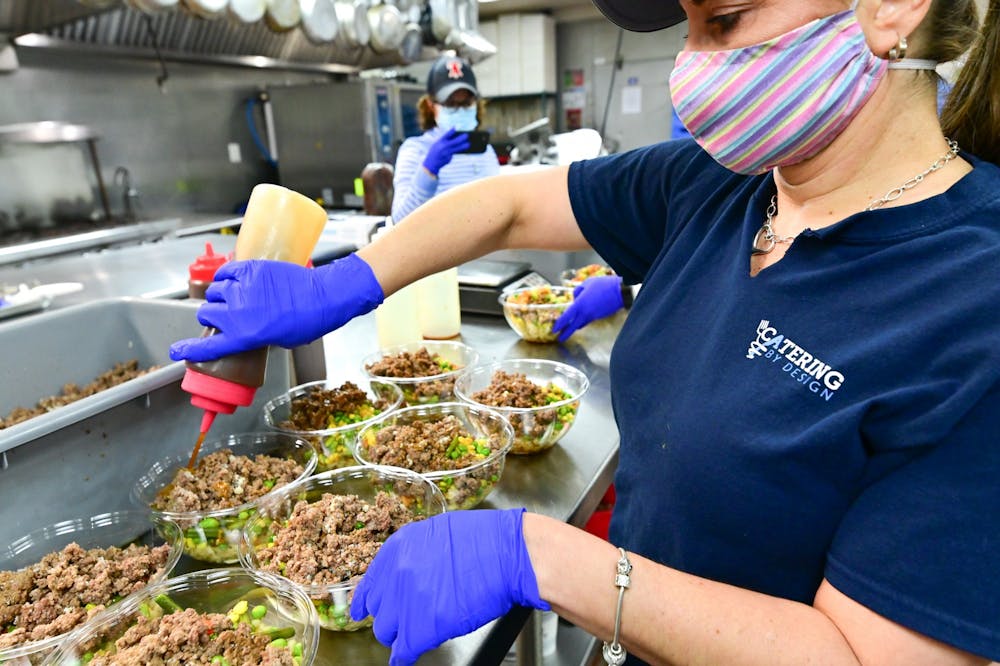Over the past year, the COVID–19 pandemic has cast a spotlight on systemic issues that have too often been overlooked. Specifically, it's illuminated a devastating and long–standing problem: food inequity. In response to the new challenges raised by the pandemic, Step Up to the Plate has worked to combat food insecurity in Philadelphia.
Step Up to the Plate began when Broad Street Ministry, a Christian church south of City Hall, was forced to cancel a fundraiser in March of 2020 due to the COVID–19 pandemic. The caterer, Catering By Design, was left with extra meals, sparking the idea that food from canceled events could be utilized to feed people in need.
“Broad Street Ministry is really focused on radical hospitality. All of our services are really about the social determinants of health,” says Laure Biron, former chief operating officer at Broad Street Ministry and interim executive director of Step Up to the Plate. “We knew that we had to come up with something that was quick and responsive. The levels of food insecurity in the city were pretty bad to begin with, even before the pandemic hit.”
Step Up to the Plate's mission is to target three dire issues: hunger, homelessness, and lack of health care. In order to better serve the community under the new circumstances, the organization has expanded its methods. “It was really important to us that the site not just be like a place that you can come and grab a meal, but that we think about the whole person and how we can continue to provide care for them in multiple ways,” Biron says.

Step Up to the Plate joined a coalition of like–minded organizations to offer a broad wealth of resources ranging from voter registration to interpretation services to COVID–19 testing. In addition to working with Broad Street Ministry, Prevention Point, and Southeast Asian Mutual Assistance Association Coalition (SEAMAAC), Step Up to the Plate has collaborated with the City of Philadelphia to install portable bathrooms at their sites, pick up trash from the events, and work with police to manage crowds.
Step Up to the Plate also has a partnership with the Hub of Hope—an organization that connects people experiencing homelessness to recovery, medical care, and safe housing—to ensure that people have a place to go to after they receive a meal.
Although services go beyond food, local restaurants have been crucial in advancing the organization's cause.
“We’ve found that with other situations happening, such as the opioid crisis and general homelessness, the Step Up to the Plate program really has eased a lot of this food concern for a lot of people,” says Alexander Sherack, owner of Papermill Fresh Asian Kitchen, one of Step Up to the Plate's restaurant partners. “Having those consistent meals throughout the week and a place to receive food has been instrumental in activating those areas and keeping people fed with their absolute basic needs.”
To target food insecurity, the organization provides meal services in Center City, Kensington, and South Philadelphia, with each center catered to that specific population’s needs. Step Up to the Plate works with restaurants to provide food that not only satisfies a person’s needs, but nourishes the senses and the soul.
“We make meals from the heart. It’s always stuff that we’d want to eat. We always try to make it a balanced and filling meal,” says Sofia Deleon, the owner of El Merkury. “We’ve received great feedback and great reception ... We are happy that we have this contract, and we’re happy that we’re helping the community. They’re happy to be getting good food, so I think it’s a win–win for everyone.”

The partnership with restaurants is definitely a win–win for everyone: on top of giving food to Philly residents, it also helps restaurants keep their businesses open.
“We lost about 60 to 70% of our income, so our partnership with SEAMAAC, Broad Street Ministry, and Step Up to the Plate has really helped a lot,” says Alfitri Ho, manager at D’Jakarta Cafe. “We could keep our restaurant running and keep all of our employees working."
With the uncertain nature of the pandemic, the future of Step Up to the Plate is unclear, especially with the rising importance of COVID–19 vaccine distribution. Step Up to the Plate has secured funding through the spring, but it's still brainstorming about how to provide vaccine education or set up actual vaccine clinics.
Regardless, Biron believes that the organization will have a role to play beyond the pandemic. “I don’t think [the pandemic ending] will dramatically change how we do what we do. I think at the end of the partnership, we’ll have to find new and different ways to continue to call upon the support of like–minded organizations throughout the city," she says.
“I think that local government has the infrastructure and has the power, and it has the voice and the platform. I think that nonprofits like us know how to have grit, and how to be responsive, and how to turn on a dime and pivot when we need to and be flexible. So I think, you know, you pair those two things, and you're unstoppable.”







